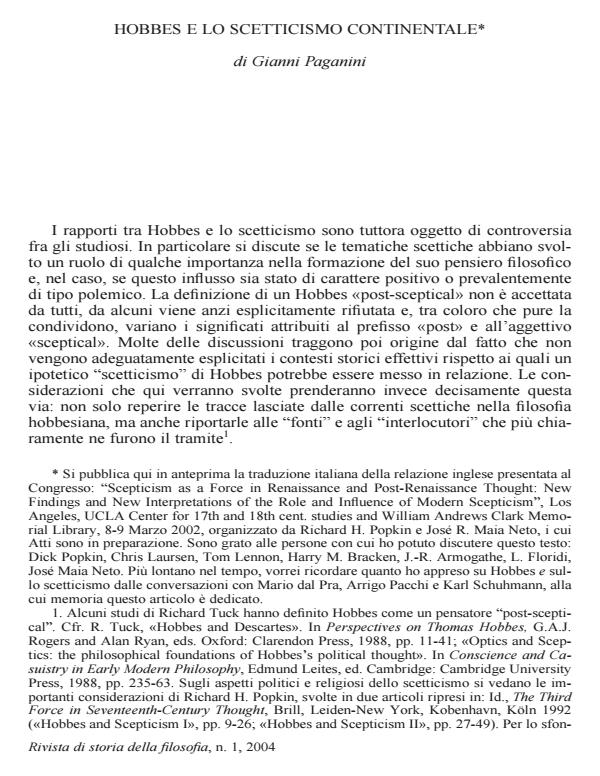Hobbes e lo scetticismo continentale
Titolo Rivista RIVISTA DI STORIA DELLA FILOSOFIA
Autori/Curatori Gianni Paganini
Anno di pubblicazione 2004 Fascicolo 2004/1
Lingua Italiano Numero pagine 26 P. Dimensione file 115 KB
DOI
Il DOI è il codice a barre della proprietà intellettuale: per saperne di più
clicca qui
Qui sotto puoi vedere in anteprima la prima pagina di questo articolo.
Se questo articolo ti interessa, lo puoi acquistare (e scaricare in formato pdf) seguendo le facili indicazioni per acquistare il download credit. Acquista Download Credits per scaricare questo Articolo in formato PDF

FrancoAngeli è membro della Publishers International Linking Association, Inc (PILA), associazione indipendente e non profit per facilitare (attraverso i servizi tecnologici implementati da CrossRef.org) l’accesso degli studiosi ai contenuti digitali nelle pubblicazioni professionali e scientifiche.
Gianni Paganini addresses the question of Hobbes's relationship to the skeptical tradition, both ancient and modern. If Hobbes borrows from ancient skepticism the idea that it is impossible to distinguish between dreams and waking perceptions, he owes to Montaigne the idea that our sensations, although they can be misleading, are our only access to knowledge. Gianni Paganini gives a systematic account of Hobbes's skeptical arguments, showing how those arguments are included in a more general dogmatic framework, resting upon the assumption that reason can infer the existence of bodies beyond the appearances or phantasms which are given in perception. Although Hobbes tends to insert skeptical elements in a causal and materialist approach to reality, he nevertheless remains, from De principis to De corpore, indebted to old and new skeptical arguments. To put it in another way, phenomena or appearances are for him our unique access into the real world. Beyond Leviathan, it is therefore Hobbes's whole work which is here presented, along the way opened by Richard Popkin, in the perspective of skepticism.
Gianni Paganini, Hobbes e lo scetticismo continentale in "RIVISTA DI STORIA DELLA FILOSOFIA" 1/2004, pp , DOI: